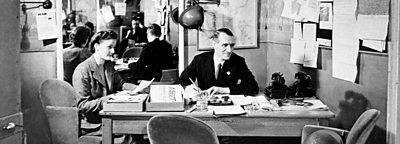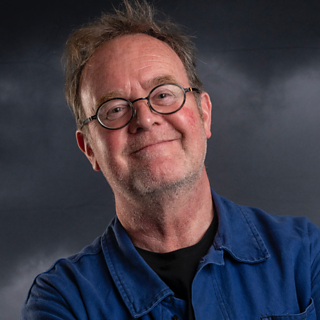Image: Cecil Madden's office in November 1940.
One valuable feature of the ÃÛÑ¿´«Ã½'s Oral History interviews with its former staff, is that these recordings often tell us a great deal about the participants’ private life and background – and this, in turn, helps us understand more fully how they approached their working life at the ÃÛÑ¿´«Ã½.
We discover, for instance, that when Cecil Madden joined the television service in 1936, he brought to his new job a fascinating range of experience – both inside broadcasting and out.
In this extract, he describes his childhood in Morocco, his schooling during the First World War – including a dangerous brush with an enemy submarine – his early life in the theatre, and his years working in industry:
Madden's experience in the theatre almost certainly proved invaluable for his later work at the ÃÛÑ¿´«Ã½ – giving him insights into working practices, an empathy with actors and agents, and a solid list of contacts when it came to booking stars to come and visit Alexandra Palace.
It also typified the close relationship that ÃÛÑ¿´«Ã½ television people in general had with show-business right from the start – something that distinguished them from ÃÛÑ¿´«Ã½ radio people, who were sometimes a touch more aloof and more often came from academic or administrative backgrounds.
Even so, Madden didn't join the television service straight from the world of commerce. He served an apprenticeship in radio, working first in the Talks Department in Broadcasting House, where he developed a radio 'newsreel' programme, and later in outside broadcasting and in the new Empire Service – the forerunner of the World Service.
Indeed, it was in radio that he gained live directing experience and helped develop the kind of mixed item 'magazine' programmes he would later deploy in series such as Here's Looking at You and Picture Page.
Television pioneers like to emphasise the buccaneering and independent spirit of Alexandra Palace, compared with what they describe as the stick-in-the-mud world of radio back at Broadcasting House – as if they were worlds apart. Yet many personal biographies reveal – sometimes unwittingly – just how much television was shaped by radio.
Madden did not last long in the Empire Service, though. In the ÃÛÑ¿´«Ã½'s outside broadcasting department, he'd been working under Gerald Cock. When Cock was made director of television, he invited Madden, along with a handful of others, to leave the Empire Service and join him at Alexandra Palace. Madden takes up the story:
Search by Tag:
- Tagged with David Hendy David Hendy
- Tagged with Voices of the ÃÛÑ¿´«Ã½ Voices of the ÃÛÑ¿´«Ã½
- Tagged with Birth of TV Birth of TV
- Tagged with Cecil Madden Cecil Madden
- Tagged with ÃÛÑ¿´«Ã½ Talks Department ÃÛÑ¿´«Ã½ Talks Department
- Tagged with Broadcasting House Broadcasting House
- Tagged with ÃÛÑ¿´«Ã½ Empire Service ÃÛÑ¿´«Ã½ Empire Service
- Tagged with Here’s Looking at You Here’s Looking at You
- Tagged with Gerald A. Cock Gerald A. Cock
- Tagged with Alexandra Palace Alexandra Palace
- Tagged with Joan Miller Joan Miller

